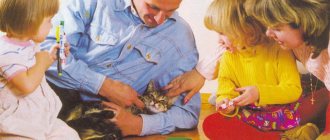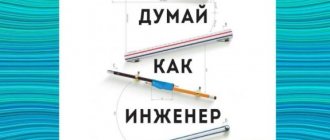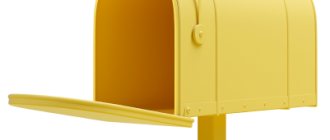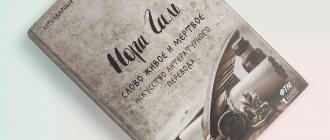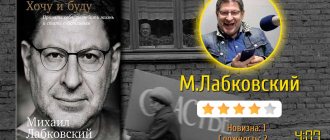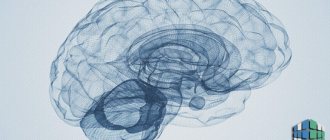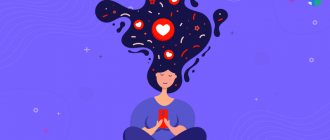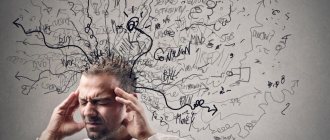First there was the word. Perhaps it was a shout or a growl. Then primitive people began to use physical force, which proved by example who was who. For many centuries, the dominant force remained physical - crusades, knightly duels, war technologies. But now humanity has returned to the word. And it acquired a new hidden meaning. And they called it “manipulation.”
We encounter this insidious young lady every day. We resort to methods of manipulation ourselves, and the most unpleasant thing is that others use them towards us. By and large, a lot depends on it. Business, economics, politics, advertising and PR, relationships (not only business ones) are built on correct manipulation. And in order to better study this ubiquitous phenomenon and learn to manage it, we have selected for you the 10 best books about the manipulation of consciousness.
Vadim Shlakhter, Sergey Kholnov – “The Art of Dominance”
Technologies and manipulation techniques have always been a secret and extremely powerful weapon of power. Today, in connection with the development of mass media and information, the role of these methods in the life of an individual and society as a whole has only increased. The book “The Art of Dominance” talks about them. And it doesn’t just tell, since it attempts not only to describe the most important techniques of mental manipulation, but also to convey the skills of using them to everyone who reads this book with all attention and seriously decides to follow the recommendations outlined in it.
When you need to understand yourself
First of all, people turn to psychologists to deal with some internal problems and limitations, but the first step can be taken without them. We have collected 5 books in which doctors and researchers teach you to understand and love yourself as the closest person.
Self-immersion: How to understand why we think one thing, feel another, and act as we always do
Vladislav Chubarov
Authenticity: How to be yourself
Stephen Joseph
Loving Imperfection: Accepting yourself and others with all their flaws
Gemin Sunim
Recipe for Happiness: Treat yourself three times a day
Ekaterina Sigitova
The magic of psychotherapy: How science helps change your life for the better
Irina Belousova
Victor Sheinov – “The Art of Managing People”
This book outlines the techniques of persuasion (basic rules, mastering techniques, self-test); technology of influence (hidden management of people, interaction analysis, protection against manipulation, hidden management and manipulation both at home and at work); the ability to win people over; how to read your interlocutor; conflict management; technology of business contacts; methods of influencing the business environment; the art of negotiation; image of a business person; Business Etiquette; what you need to know about foreign partners and much more.
3. Erich Fromm “The Art of Loving”
Having been published in 1956, the book “The Art of Loving” quickly became popular. Today this is Fromm's most famous work. It is based on the psychological aspects of the main human feeling - love. How it arises, what is required for this, is it really art - the author answers these questions. Fromm convinces that learning to live for another person, giving love and warmth is the ability to love. Many people love for beauty, wealth, privileges - for the wrapper. Few people are interested in the internal. It is important to be able to consider the inner world, to understand the soul of another. The book describes different forms of love: parents and children, friends, homeland, men and women. It is different, and mastering this art is happiness.
Timur Gagin, Svetlana Borodina – “Exposure of magic or a reference book for a charlatan”
A book about “magical” influences on the human mind (psychotherapeutic, religious, “magical”, advertising, political, etc.). The authors came to the conclusion that all these techniques have a similar structure: “technically” everything is done according to the same scheme. Moreover, this can be learned. On the other hand, the book will be useful for those who do not like to be fooled. After reading it, immunity from any deception is guaranteed (from the influence of advertising texts, speeches of politicians, yellow media, etc.).
Blog / 20 main books on psychology
Our top 20 is specially compiled to cover all areas of psychotherapy. Two people worked on this list, so Jungian mysticism is balanced with classical psychoanalysis, and scientific pop coexists with serious research. If you have no idea where to start getting acquainted with psychology, in our list you will find several entry points into this science.
1. “Escape from Freedom” and “Man for Himself”, Erich Fromm
It is good to read the books of the neo-Freudian and existentialist Fromm in a row - they are interconnected, the next one reveals the previous one. If in the first Fromm talks about why freedom can be a threat for some people, and about why people are so indifferent to themselves, then in the second he writes about a person who took upon himself the courage to take care of himself and his own realization. He considered life to be an art in which “man is at once artist and model, sculptor and marble, doctor and patient.”
2. “Who Runs with the Wolves,” Clarissa Pinkola Estesse
In a nutshell, this is the psychoanalysis of fairy tales. Estess is a student of Jung, a philosopher and a hereditary professional storyteller (cantadora). With such introductory information, it is not surprising that this particular woman wrote a hefty book about female archetypes. Her “psychoarchaeological” excavations are somewhat reminiscent of Propp’s book “The Morphology of the Fairy Tale” (Propp divides all world folklore into structural elements). Analyzing the plots of fairy tales (which are very similar in different countries), she talks about the history of the female spirit and the trials that a woman faces: separation from her mother, awakening her own intuition, an abusive partner (Bluebeard), union with another, initiation.
3. “Memories, Dreams, Reflections”, Carl Gustav Jung
The best place to start getting to know Jung is with his autobiography. This is a book about Jung's development as a researcher and psychotherapist, about his eternal curiosity about everything connected with the inner world of man. The most interesting thing is to follow the dramaturgy of human life: how and why Jung abandoned Freud, how travel changed the scientist’s worldview, and other twists of fate. The book is gold for those who believe that everything in the world is interconnected.
4. “The Gestalt Approach and Witness Therapy”, Frederick Perls
We have already made a separate material about Gestalt therapy; this is a book by the founding father of Gestalt therapy. Fritz Perls was a master of provocation and paradox. It seems that his book was written with the goal of stirring up the reader and returning him to interest in himself. Gestalt therapy methods are also collected here, some of them (say, in a whisper) can be practiced without a therapist. For example, in a problematic situation, try asking yourself five questions: “What am I doing?”, “How am I feeling?” and “What do I want?” “What am I avoiding?” and “What am I waiting for?”
5. “The Gift of Psychotherapy”, Irvin Yalom
In fact, Yalom is known for completely different, more poppy books, but you can read them without our recommendations. “The Gift of Psychotherapy” is a very detailed answer to the question “What should a good psychotherapist be like?” 85 short chapters with stories from personal experience in which Yalom very movingly describes the therapeutic relationship: he explores the phenomenon of boredom, discusses whether the patient can be meaningful to the therapist, and tells how to use the therapist's feelings to understand the patient.
6. “Diary of a Schizophrenic Woman”, Margarit Seshay
Marguerite Sechey is a Swiss psychoanalyst who, for several years, treated a girl diagnosed with schizophrenia. The book, at the same time, is written on behalf of the patient - and represents a brilliant and subtle insight into how the psyche of a person with a disorder works: how it works, what logic it obeys, and so on. As Freud wrote, quoted by the author herself: “These patients have turned away from external reality and precisely because of this they know much more than we do about the inner, psychic reality, and can tell us about aspects that would otherwise remain inaccessible to us.”
7. “The Drama of the Gifted Child,” Alice Miller
When people ask us “what should I read about psychology,” we always recommend this book first. Why? Because it very easily, but at the same time deeply introduces psychotherapeutic knowledge - namely, it talks about how a child’s relationship with his parents influences the formation of his personality and those internal conflicts with which he, having matured, begins to go to a psychotherapist.
8. “Sigmund Freud in His Time and Ours,” Elisabeth Roudinesco
A good biography of Freud, written by the French psychoanalytic researcher Elisabeth Roudinesco. From it you can, firstly, understand the basic psychoanalytic ideas, and secondly, understand exactly how they arose - how time, the context of the era, the personality of Freud and his environment influenced them and gave them shape.
9. “The Neurotic Personality of Our Time,” Karen Horney
A healing book for the urban neurotic (that is, for all of us). It really helps to understand why we choose rejecting partners, are afraid of any competition, fall into workaholism, love codependency so much - and what hostility has to do with it. Horney offers a real algorithm for analyzing and overcoming your internal complexes and conflicts. Excellent and simply written.
10. “Relationships of love. Norm and pathology", Otto Kernberg
A little complex for the unprepared reader, but brilliant and shimmering with all the colors for those who already understand a little about psychotherapy, this book is devoted to the study of relationships, namely, how our old internal conflicts manifest themselves in them, how love and hate are connected in them, what the role of sexuality and so on.
11. “Under the shadow of Saturn. Men's Trauma and Healing by James Hollis
A male version of “Wolves Runner,” but five times smaller. James Hollis, another Jungian analyst, writes about the development of a man. (Let’s make a reservation right away: Jungians are not sexists, they work with male and female archetypes) Hollis describes the whole bunch of problems that a man has to overcome on the path to maturity: the absence of a father figure and initiation rituals, a mother complex, refusal to recognize the feminine in himself.
12. “Sexual psychopathology”, Richard von Krafft-Ebing
This book by a German psychoneurologist was published in 1886 and caused a lot of noise. The mere mention of sex was considered obscene in the society of that time, but Krafft-Ebing did not limit himself to just one mention, but compiled a catalog of all possible manifestations of human sexuality. Let's just quote the table of contents: Love for old women, Fabric as a fetish, Flagellation of boys, Defilers of corpses, Fetishism of the foot and shoe - and so on. Extremely fascinating reading.
13. “Psychoanalysis of Literature”, Ivan Ermakov
A very rare book, which can only be found on used book sites - but nevertheless, we decided to include it in the selection, since it represents one of the first psychoanalytic works written in Russia. Ermakov's works, published in the early 1920s, are devoted to the study of literature - and the psyche of the writers themselves. From them you can learn, for example, what the psychological background of Pushkin’s works is, about Dostoevsky’s relationship with psychoanalysis, and also about the fact that Gogol was diagnosed with bipolar disorder.
14. “Psychoanalytic diagnostics. Understanding Personality Structure in the Clinical Process by Nancy McWilliams
If Jung is magical realism, then McWilliams is a very cool written detective story. The book is divided into two parts: the first talks in detail about all psychological defenses, and the second about the types of character organization. It looks like a detective story because a person’s character is made up of strictly defined “evidence”: from what his parents were like, from what defenses he uses, from how he feels in this world. Don't look away.
15. “Say YES to Life,” Viktor Frankl
Austrian psychiatrist and former Nazi concentration camp prisoner, Viktor Frankl shares his memories of that terrible time. However, the book is as much autobiographical as research. Frankl observes a man who finds himself in himself and writes about a person’s relationship with life in its most extreme manifestations, as well as about the reactions, defenses and questions that arise in him under these conditions.
16. “Formation of personality. A Perspective on Psychotherapy by Carl R. Rogers
Carl Rogers is one of the creators of instructive person-centered psychotherapy. In the book, he also talks about the formation of his views on psychotherapy and his departure from Freudian psychoanalysis. This seems to be a book about true humanism and true understanding. The more a person listens to himself and strives to understand others, the more he respects the complex course of life, and the less he strives to change and manipulate other people. It is this therapeutic relationship that leads to great personal change.
17. “Secret support”, Lyudmila Petranovskaya
I would like to write about this book in one line and in capslock: THIS BOOK SHOULD BE GIVEN OUT IN MATERNITY HOSPILS INSTEAD OF RECRUITING A NEWBORN. However, there will be more benefits. It is in “Secret Support” that it talks about containing the feelings of a small child, about how to teach him to show aggression correctly, about not sharing toys - a balm for the souls wounded by Dr. Spock (for those who don’t remember, in the 1980s Spock taught our mothers should feed their children by the hour and not pick them up). If we were raised according to this book, we would have long ago lived in the beautiful Russia of the future.
18. Freud, Peter Guy
A comprehensive biography that introduces the reader not only to the bizarre twists and turns of Sigmund Freud's life, but also details his ideas: from their inception, through social resistance, to widespread acceptance. A good option for those who want to become more familiar with the basics of psychoanalysis - but do not want to read textbooks.
19. “The Interpretation of Dreams”, Sigmund Freud
Freud's first major work, in which he reveals in detail such a key concept for psychoanalysis (and for all psychotherapy) as the unconscious. In particular, it states that dreams are not just a set of random images, but a kind of manifestation of the human psyche, under which, like the tip of an iceberg, lies a deep symbolic meaning.
20. “The Man Who Mistook His Wife for a Hat,” Oliver Sacks
An international bestseller written by neuroscientist Oliver Sacks. Strictly speaking, it doesn't have much of a psychotherapeutic perspective - it's more about documenting the symptoms of mental activity and illustrating how bizarre they can be - but that doesn't make the book any less interesting.
Based on the stories of his patients, Sachs discusses how our psyche works - and does this with sincere interest and love for it. Moreover, in his book he rebels against the traditional, highly mechanistic approach to the treatment of mental disorders and, like Dr. House, focuses on matching the method to the patient's personal experience.
7. Sigmund Freud “The Interpretation of Dreams”
More than a century ago, this first major monograph by Freud was published. But initially the book was not successful with buyers. Recognition came decades later. In his work, the author first outlined the concept of psychoanalysis. The publication appeared in Russia in 1913 and immediately found admirers. The works of the psychoanalyst are also interesting to the modern reader. He explores the dream as part of the unconscious. According to his theory, the explicit dream hides the unconscious; it is repressed desires. Dreams protect sleep and go from transforming thoughts into images denoted by symbols. Freud worked on the work for many years even after publication, making additions and reprinting eight times. The sequence of presentation and many examples distinguish “The Interpretation of Dreams.” The book requires study; this is necessary so as not to get a distorted impression of the theory of the psychoanalyst.
"Understanding Human Nature" Alfred Adler
The Austrian psychologist and psychiatrist, the author of the term “inferiority complex,” talks about the significance of the period of infancy and early childhood, about a person’s adaptation in society, about the development of character and its manifestations.
Adler assures that a person is responsible for his every action and is able to change his behavior, which affects interpersonal relationships.
"Games People Play. Psychology of Human Relationships", Eric Berne
A book that became an international bestseller in a matter of months. It is worth reading for anyone who is ready to go beyond the usual scenarios, understand the motives of their own actions and other people, and also find out where and how the conflict develops. The author is confident that anyone can change their life if they are determined.
4.Stephen Covey “7 Habits of Highly Effective People”
As soon as it was published, Covey's book became a bestseller. As time passed, it became clear that this work influenced the lives of many famous people and helped them become successful. In 2011, Time identified this work as one of the most influential in the field of business psychology. The book describes the principles underlying a person’s value system and explains why it is necessary to develop character. The theme of personal and social victory is considered, and the principles of self-renewal are narrated. A number of skills that need to be worked on are aimed at the inner world, they activate the abilities of self-control. Through his own victories, a person gains independence, which helps to achieve public victories. According to the author, problems need to be solved, rather than justifying failures. To begin with, you need to get rid of stereotypes imposed by others, free yourself from habits that lead away from reality.
Final chord. Self-education
"Technology of life. A book for heroes” – Vladimir Tarasov
Another book that can be classified as a table book - you can return to what you have written and think about each story. The book consists of parables that look at different life situations and help us find a way out. With each parable, the author gives a hint, suggests reconsidering our relationship to everything around us. Reading this book will allow you to more consciously perceive your own life, and take into account the principles, values and beliefs of the people around you when interacting. Vladimir Tarasov has been teaching for more than 30 years, and he builds his principles on ancient Chinese philosophy, adapted to our realities.
"Where's My Cheese" - Spencer Johnson
On this topic: Polygraph when applying for a job.
How it works and why it is needed At first glance, this book may seem insignificant. Both in size and in essence. But the story in the form of a fairy tale is swallowed in one sitting, makes you think, identifying yourself with one of the two characters. The book is close to “books of one thought”, but deserves attention and a couple of hours to read.
“Your Own MBA” – Josh Kaufman
Book/checklist for self-education. The author is anti-MBA (Master of Business Administration). He tells how you can replace expensive training with self-development. Kaufman collected and quite briefly described all the components of a full-fledged MBA education, and therefore after reading you are left with an understanding of the structure of processes not only in a company, but also in relationships between people. The author also analyzes personal components. The book can add the missing puzzles in your head and, thanks to the literature proposed by the author, continue self-education. For experienced people, reading is also useful - it helps to refresh and systematize knowledge.
Igor Khudnitsky is developing a non-profit project, Business Intelligence Club, for students and young professionals. Owners, entrepreneurs and experts share practical experience with everyone. You can find out more about the club here.
“Psychology of emotions. I know how you feel." Paul Ekman
Emotions are our constant companions, sometimes they are intrusive, sometimes they are simply inappropriate. We clumsily try to hide fear, sadness or joy. and sometimes we think that we perfectly understand the feelings of another, but we are often mistaken. Paul Ekman talks about how to pick up on hidden signals that come from your interlocutor in the form of gestures and emotions, as well as how to hide and correct your own.
Even the most “inconspicuous” changes in facial expressions—the folds around the eyes or the position of the eyebrows—are important. They can tell what a person is experiencing at a given second: fear, surprise, or maybe disgust? The book is illustrated with photographic examples, and at the end you will find an emotion recognition test to test your own knowledge.
10. Mikhail Labkovsky “I want and I will”
This book is a workshop that gives the keys to establishing internal order. This is a gift to readers in the form of a “box of tools” that can be used by the reader at the right time. Labkovsky is sure that everyone has the right to do whatever they want, this gives a feeling of happiness. You need to understand yourself, then a feeling of joy in life will come. The author reveals the reasons that interfere with mental health. The distinctive feature of his narration is its specificity. He explains any complex question clearly. Some statements seem radical, surprising, even shocking. But they work! The advice does not delve into childhood traumas or analyze the past. Desire is enough to change your life.
9. Igor Vagin “The best psychotechniques for success”
Almost forty bestsellers with a circulation of three million copies - Igor Vagin is today in the top three most read Russian psychologists. This book has collected the most effective developments of the author. They teach to eradicate fears, guilt, anger, help to determine life goals, raise self-esteem, and overcome various obstacles. Vagin is sure that grievances lie at the heart of conflicts. They cause more harm than the situation itself that made you angry. To be in harmony with others, you need to learn to manage your emotions. The psychologist offers his own methods that will make you overcome emotions and overcome anxiety.
“The psychology of lies. Fool Me If You Can" Paul Ekman
Now let's repeat with Ekman. The author is confident that you can expose a deceiver if you know what to look for during a conversation. Ekman invites the reader to understand how a smile can give away lies, what microgestures and microexpressions mean. The book tells what types of lies there are, what the deceiver feels at that moment and how it manifests itself. All this is supported by examples from history.
